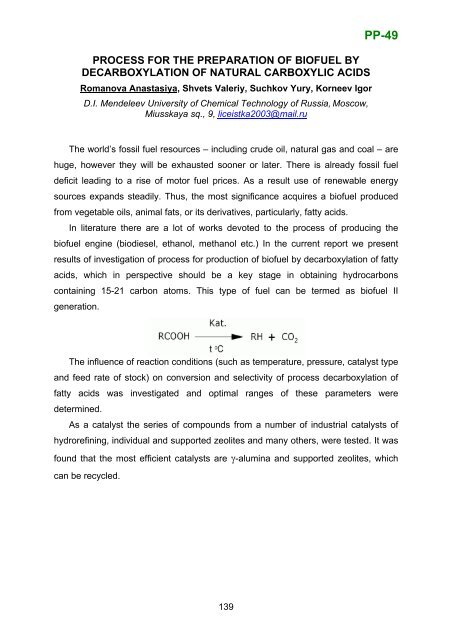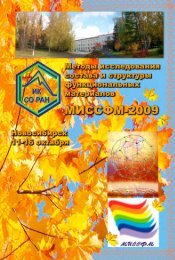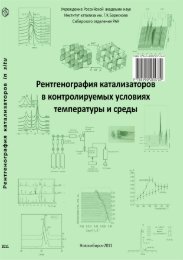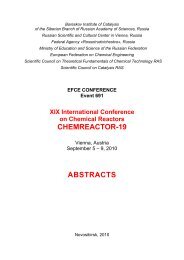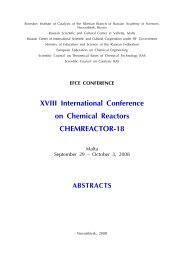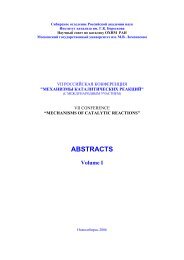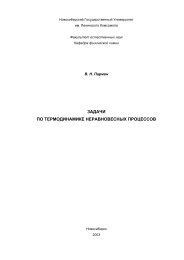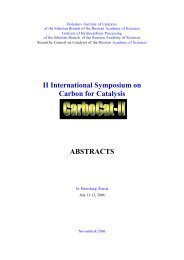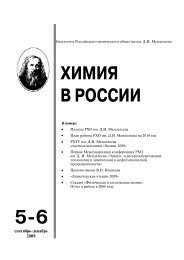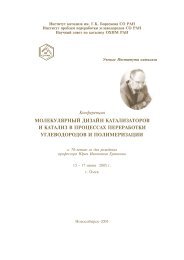PP-48INVESTIGATION OF NEW WAYS OF BIODIESEL PRODUCTIONRomanova Anastasiya 1 , Khanikyan Vago 2 , Kustov Andrey 3 , Sapunov Valentin 41 D.I. Mendeleyev University <strong>of</strong> Chemical Technology <strong>of</strong> <strong>Russia</strong>, Moscow,liceistka2003@mail.ru, +7(499)77969732 A.N. Nesmeyanov <strong>Institute</strong> <strong>of</strong> Organoelement Compounds <strong>RAS</strong>, Moscow,vagokhan@rambler.ru, +7(499)77969733 "VEGA-CHEM" Ltd., Moscow, koustov@muctr.edu.ru, +7(499)97895544 "VEGA-CHEM" Ltd., Moscow, sapunovvals@gmail.com, +7(499)9789554Biodiesel is a renewable diesel fuel that is also known as FAME (fatty-acid methylester) in the European Community. Biodiesel has the advantage that it works just aswell as normal diesel fuel, but the combustion process expels lower concentrations <strong>of</strong>toxic emissions. It is made from animal fats, vegetable oils or recycled restaurantgreases. As is known, the traditional technologies for Biodiesel manufacture haveseveral disadvantages. For example, there are very stringent requirements onavailability <strong>of</strong> water and free fatty acids (FFA) in raw vegetable oil in case <strong>of</strong>homogeneous alkaline catalysis using. The large ratio <strong>of</strong> Methanol/ Oil, hightemperature and pressure and also a relatively short lifetime <strong>of</strong> the catalyst are themain disadvantages <strong>of</strong> technology <strong>of</strong> heterogeneous catalysis. For decision <strong>of</strong> theabove enumerated questions, we have carried out various studies usingheterogeneous and homogeneous catalysis as well. The most interesting results wehave obtain by using FA salts <strong>of</strong> lead (II) as a homogeneous catalysis. This variant <strong>of</strong>process design allows carrying out the transesterification <strong>of</strong> vegetable oil in relativelymild conditions and in presence <strong>of</strong> any quantity <strong>of</strong> FFA in the feedstock. In addition,using <strong>of</strong> lead (II) salts in contrast to the alkali catalysts excludes, practically, theproblems, which associated with the stages <strong>of</strong> phase separation <strong>of</strong> the final productsin case <strong>of</strong> transesterification <strong>of</strong> vegetable oils by other lower alcohols. Analysis <strong>of</strong>distribution <strong>of</strong> lead compounds in the reaction products and their comparison with theobtained kinetic regularities <strong>of</strong> the process, allowed us to <strong>of</strong>fer a variant <strong>of</strong> reuse <strong>of</strong>the catalyst, which makes this technology attractive also.138
PROCESS FOR THE PREPARATION OF BIOFUEL BYDECARBOXYLATION OF NATURAL CARBOXYLIC ACIDSRomanova Anastasiya, Shvets Valeriy, Suchkov Yury, Korneev IgorD.I. Mendeleev University <strong>of</strong> Chemical Technology <strong>of</strong> <strong>Russia</strong>, Mosсow,Miusskaya sq., 9, liceistka2003@mail.ruPP-49The world’s fossil fuel resources – including crude oil, natural gas and coal – arehuge, however they will be exhausted sooner or later. There is already fossil fueldeficit leading to a rise <strong>of</strong> motor fuel prices. As a result use <strong>of</strong> renewable energysources expands steadily. Thus, the most significance acquires a bi<strong>of</strong>uel producedfrom vegetable oils, animal fats, or its derivatives, particularly, fatty acids.In literature there are a lot <strong>of</strong> works devoted to the process <strong>of</strong> producing thebi<strong>of</strong>uel engine (biodiesel, ethanol, methanol etc.) In the current report we presentresults <strong>of</strong> investigation <strong>of</strong> process for production <strong>of</strong> bi<strong>of</strong>uel by decarboxylation <strong>of</strong> fattyacids, which in perspective should be a key stage in obtaining hydrocarbonscontaining 15-21 carbon atoms. This type <strong>of</strong> fuel can be termed as bi<strong>of</strong>uel IIgeneration.The influence <strong>of</strong> reaction conditions (such as temperature, pressure, catalyst typeand feed rate <strong>of</strong> stock) on conversion and selectivity <strong>of</strong> process decarboxylation <strong>of</strong>fatty acids was investigated and optimal ranges <strong>of</strong> these parameters weredetermined.As a catalyst the series <strong>of</strong> compounds from a number <strong>of</strong> industrial catalysts <strong>of</strong>hydrorefining, individual and supported zeolites and many others, were tested. It wasfound that the most efficient catalysts are γ-alumina and supported zeolites, whichcan be recycled.139


